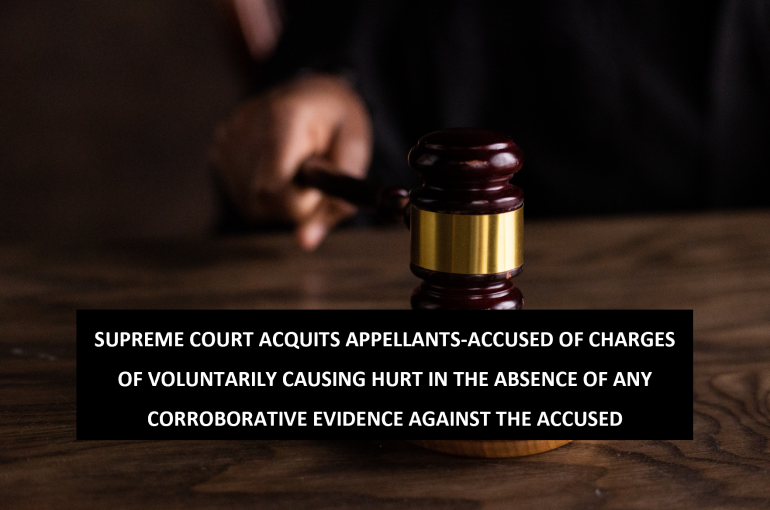SUPREME COURT ACQUITS APPELLANTS-ACCUSED OF CHARGES OF VOLUNTARILY CAUSING HURT IN THE ABSENCE OF ANY CORROBORATIVE EVIDENCE AGAINST THE ACCUSED
A two Judge Bench of the Supreme Court comprising of Justice S. Ravindra Bhat and Justice Aravind Kumar passed a Judgment dated 19.07.2023, in Boini Mahipal And Anr v. The State of Telangana, Criminal Appeal No. 1750 of 2023, and held that the Appellants-Accused ought to be acquitted as the Prosecution did not clearly establish two facts, i.e. (1) the Appellants indeed assaulted the Deceased and (2) that the alleged injuries sustained by family members of the Deceased were caused by the Appellants and thus, those facts remained merely bald statements without proof.
Facts
i) In the present case, the Complainant, who is the son of the Deceased- Anjamma, filed a Complaint dated 13.04.2012 at 8:10 a.m with the Koheer Police Station, Telangana, stating that on 08.04.20I2 at 9.00 p.m, one, Boini Sangaiah (Accused No. 1), Boini Sreenu (Accused No. 2), Boini Mahipal (Accused No. 3), Boini Chinna (Accused No. 4), Naikini Venkat (Accused No. 5), and Damasthapally Raju (Accused No. 6) came to the Complainant’s house, physically assaulted his Mother, Anjamma (Deceased), A1 further kicked forcefully on her stomach, due to which, she fell on ground and subsequently died in the hospital on 12.04.2012 at 9.00 p.m.
ii) Based on the aforesaid Complaint, the Police registered an FIR against the Accused 1 to 6 in Crime No. 21 of 2012 for the offences punishable under Sections 302 of the Indian Penal Code, 1860 (IPC) (Punishment for murder), 323 IPC (Punishment for voluntarily causing hurt), 504 IPC, (Intentional insult with intent to provoke breach of the peace) read with Section 34 IPC (Acts done by several persons in furtherance of a common intention), and took up the investigation.
iii) Thereafter, the Police conducted the investigation, recorded the statements of the Witnesses, visited the place of occurrence, and conducted the scene of the offence Panchanama before the mediators.
iv) Upon arresting the Accused and collecting the relevant documents, a Charge Sheet was filed against the Accused for the offence punishable under Section 302 IPC read with Section 34 IPC before the Ld. Principal Sessions Judge, Sanga Reddy, Telangana (Trial Court) in SC 376 of 2012.
v) Thereafter, based on the evidence of the Sub-Inspector of Police, the Investigating Officer (I.O.) upon cross-examination admitted that prior to the filing of the aforesaid Complaint by the Complainant, the Police had registered a case against the Accused for the offence punishable under Section 323 IPC.
vi) The Ld. Trial Court came to the conclusion that the Prosecution failed to establish any motive for committing murder of the Deceased and hence, the Accused were acquitted of the charges under Section 302 IPC. However, the Trial Court observed that the Accused could only be held guilty for causing hurt, which is punishable under Section 323 read with 34 IPC, and thereby, held the Accused 1 -4 and 6 guilty of the offence of voluntarily causing hurt which is punishable under Section 323 read with Section 34 IPC. As a result, the Trial Court convicted the Accused 1-4 and 6, vide Order dated 15.11.2012 and thereby, sentenced them to undergo rigorous imprisonment for 6 months and to pay a fine of Rs. 1000/- each, and in default, simple imprisonment for a period of 2 months.
vii) Aggrieved by the Ld. Trial Court Order dated 15.11.2012, the Accused 4-6 filed an Appeal bearing CRLA 1168 of 2012 before the Hon’ble High Court of Telangana, at Hyderabad, which was dismissed by the High Court, vide Order dated 11.01.2023.
Supreme Court Analysis and Findings
Aggrieved by the High Court Order dated 11.01.2023, the Appellant filed Criminal Appeal No. 1750/2023 before the Supreme Court. The Apex Court passed a Judgment dated 19.07.2023, and made the following observations:
1) That Ld. Trial Court, while appreciating the evidence submitted by Prosecution, observed as follows:
“17. From the above evidence, xxx in the incident. The evidence of PW-5 shows that A-1 kicked the deceased with his leg and the remaining accused were beating the family members of PW-2. But his evidence that he could not clearly make out the specific overacts of the accused, as the family members of PW-2 and the accused formed into a crowd, can be taken into consideration, not for concluding that the other accused did not beat the deceased, but xxx circumstances.”
2) That the Apex Court found that there was no cogent and positive evidence available to prove or establish the fact that the Appellants assaulted the Deceased. Further, the Prosecution attempted to project the case that relatives of the Deceased were beaten or assaulted by the Appellants. However, if the said facts were to be so, nothing would have prevented the relatives of the Deceased, who accompanied the Deceased to the hospital, from getting themselves treated for any purported or alleged injuries sustained by them. However, no evidence is submitted in this regard.
3) That the statement deposed by Prosecution Witnesses is the consistent stand that Accused No. 1 had kicked the Deceased on her stomach. Nowhere have they admitted to any overt acts committed by the Appellants.
Conclusion
Thus, based on the aforesaid observations, the Supreme Court held that the Prosecution failed to establish the offence of assault, voluntarily causing hurt, etc against the Appellants-Accused 4-6 in respect of the Deceased and the alleged injuries sustained by family members of the Deceased. Thus, such submissions made by the Deceased’s family members were held as mere bald statements without proof. Hence, the Appellants were acquitted. As a result, the Appeal filed by the Appellants-Accused 4-6 was allowed, and the High Court Order dated 11.01.2023 and the Trial Court Order dated 15.11.2012 that convicted the Appellants-Accused 4-6 were set aside.
Suneel Jaiswal
Associate
The Indian Lawyer





































Leave a Reply